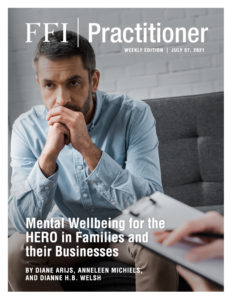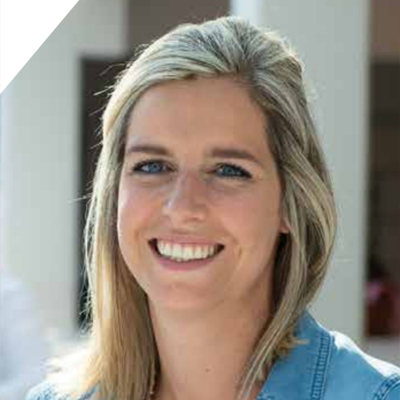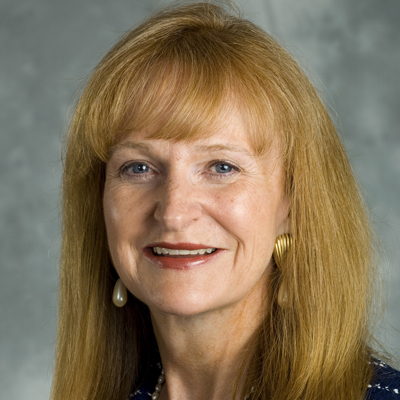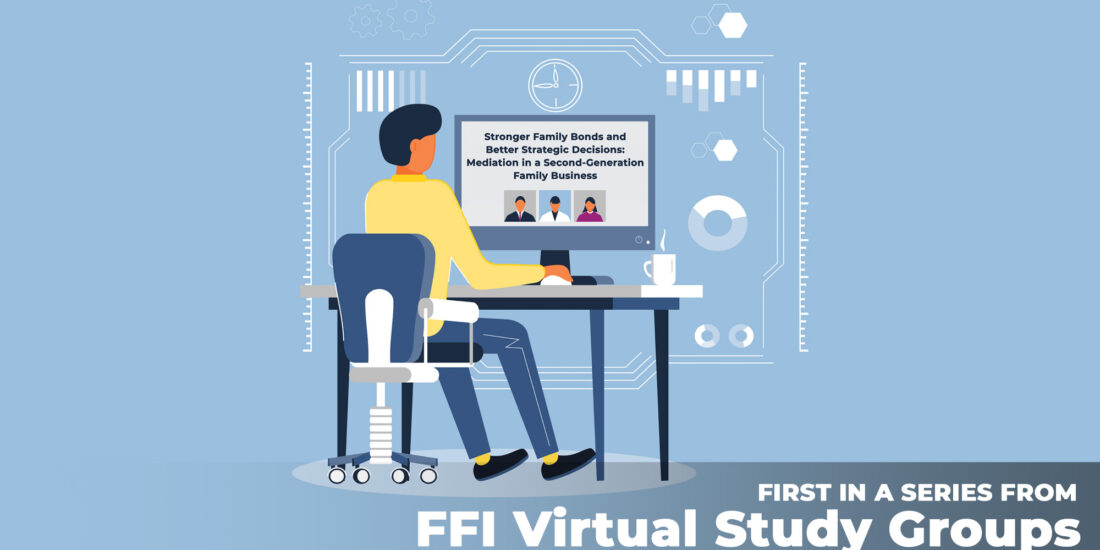
View this edition in our enhanced digital edition format with supporting visual insight and information.
Thanks to this week’s contributors, Diane Arijs, Anneleen Michiels, and Dianne H.B. Welsh, for this edition about their recent research on mental health in family businesses and how to work with your clients to stimulate their psychological capital to promote mental wellbeing.
Mental Health in Family Business Systems
Within a family business, tensions among business family members arise when making difficult decisions—for example, deferring dividend payouts for employment security or whether to change a business model rooted in tradition (De Massis & Rondi, 2020). Notwithstanding the extra strain caused by the pandemic, business families are confronted with a double-edged sword when it comes to their mental health because of the entangling of the business system and the family system. This interdependence might lead to an understanding of the importance of work-family balance, but it is equally likely to result in conflicts, because frustration building up in one system can easily slip over to the other system.
The ongoing challenges that business family members face regarding their mental health propelled us to address how to deal with these challenges (Arijs & Michiels, 2021). The article takes a preventive perspective to foster and maintain mental wellbeing beyond merely a restorative perspective. There is currently a lack of knowledge about the ways in which being involved in the family business can affect the mental health (both for good and for ill) of individual family members and of the family system. Furthermore, insights into tools that would promote and maintain mental wellbeing in business families are scarce.
That’s why we aim to inspire family business practitioners with some basic tools and insights on how to incorporate and stimulate psychological capital (PsyCap) among business family members to promote mental wellbeing. PsyCap is the HERO (Hope, Efficacy, Resilience, Optimism) within us and has proven to result in better mental wellbeing and business performance and can be increased within us (Luthans et al., 2017).
Psychological Capital: It’s Trainable!
Let us emphasize that psychological capital is trainable: neuroscientists found that about 40% of our PsyCap can be developed by training thanks to our brain plasticity. To train psychological capital, deep-seated convictions and beliefs need to be challenged and replaced with more positivity and confidence in one’s abilities to reach specific goals. We can reprogram our minds to benefit from less tension, less anxiety, higher frustration tolerance, and more mental wellbeing. It also increases creativity in family businesses (Ponroy & Welsh, 2020; Welsh, Ponroy, & Niemand, 2019).
Business family members with a long-shared history are particularly vulnerable to these deep-rooted negative convictions. Here are some observations that business family members shared with us during our coaching sessions:
“It is as if I cannot outgrow being their little brother. Will they ever take me seriously?”
“I don’t know how it is possible, but with my colleagues, with friends, I can make my case, but when I sit together with my family to discuss the business succession plans, I can hardly get out my words.”
“He has always been an impulsive child. I start to tremble when he kicks off with, ‘I have a new idea.'”
As a coach, it is vital to bring these activated filters about each other to the surface. Filters are characterized by extreme or absolute words, such as “always” or “never,” “again”, and are coupled with emotional aggression (fight) or clamming up (flight). Activated filters restrict our interpretations to fit our long-lasting convictions or unconscious patterns in the family system. To avoid fooling ourselves by misinterpreting situations or expressions, we need to create balance in the autonomic nervous system. This means that we reprogram our ‘software of the mind’ to integrate openness and reflection in our unconscious judgments (Blase & Plooij, 2020).
Here are some practical tips in advising business family members:
- Make family members familiar with the signaling words pointing to activated filters towards each other.
- Make members aware of facial expressions and intonation of voice during communication and the responses these trigger among recipients.
- Encourage members to reframe the discussion whenever they feel emotional distress, which creates empathy and results in ways to meet several needs simultaneously.
- Make members aware of the benefits of breathing and provide them with tools to practice. In the heat of the moment, a short but conscious breathing exercise can be a situation savior. These breathing techniques result in more conscious and balanced word choices and thus lead to connective communication patterns instead of defensive ones, improving family dynamics.
These interventions can support the family system, the wellbeing of the business family, and the individual family members. Critical self-reflection is of utmost importance to benefit from these advantages sustainably. Our experience is that most business family members need guidance to figure out critical self-reflection (Korthagen & Vasalos, 2005). Of course, this self-reflection needs to be supplemented with developmental strengths-based coaching by a trusted coach.
Sound communication is claimed to be essential in family businesses to ensure business survival across generations. As family business advisors, we cannot forget that training and practicing communication skills is not enough. Unfortunately, business family members often regret that despite good communication training, they have emotional outbursts and react in a defensive way or shut down at moments that matter with their relatives. If we truly want to facilitate communication and family dynamics in a sustainable way, we need to train our business family clients in mental resilience and stress coping. Only then we can ensure that our family business clients will be able to ease tension to activate the route in their brain which allows them to incorporate the trained communication skills during tougher interactions. We recall the use of breathing techniques and of rational-emotive training to challenge limiting convictions, and replace the negative thoughts with helpful thoughts to achieve goals.
Team Up
If we want to foster the psychological capital of families in business, we need family business coaches that can provide the necessary training and coaching at the individual and family level. The cultivation and stimulation of collective family efficacy means that a family business advisor is not only able to provide individual coaching to foster self-efficacy but also group coaching to the family. Such coaching can support shared beliefs in the capabilities of the family as a group and can help individual family members to welcome and embrace each others’ differences. This kind of support can serve as a prevention or a healing mechanism against rivalry, e.g., among successors.
Business families need therapists that are familiar with family dynamics and systems work, and who have an affinity with the family business context. These families also need business consultants who can focus on business challenges (Danes and Brewton, 2012). Whoever is involved depends on the needs of the business family at that moment. An exchange of information, ideally an interdisciplinary partnership, between these two types of advisors might be most beneficial to ensure sustainable family business success. We encourage family business advisors to team up with experts in other domains (family therapists or communication experts) when their knowledge is insufficient for dealing adequately with specific mental health needs.
Sometimes clients are afraid that the changes necessary to reach connective communication and better mental wellbeing might be impossible for them to achieve. In that case, it is useful to explain how human beings can change their habits through improving individual and group psychological capital. Insight into what is needed to achieve sustainable results is essential: training, self-reflection, personal coaching, and group coaching will all be needed. It is important to give the family business clients a realistic time frame both in duration and time investment (from several months to years) that the process of developing psychological capital will demand. Furthermore, if family business clients experience the benefits of more family balance and inner balance, they are often ready to continue their investment in PsyCap in the long run. We hope that more family business clients will treat the mastery of individual wellbeing and family wellbeing as crucial competencies for their family business owners to develop, which can be embedded in a family constitution.
References
Arijs, D., & Michiels, A. (2021). Mental health in family businesses and business families: A systematic review. International Journal of Environmental Research And Public Health, 18 (5), doi: 10.3390/ijerph18052589 Open Access
Blase, K., & Plooij, A. (2020). Neurobiologie van gevoelens van veiligheid. Tijdschrift voor Integrale Geneeskunde, 35(3), 208-211.
Danes, S.M., & Brewton, K.E. (2012). Follow the capital: Benefits of tracking family capital across family and business systems. In Understanding Family Businesses (pp. 227-250). Belin/Heidelberg, Germany: Springer. pp. 227–250.
Erdogan, I., Rondi, E., & De Massis, A. (2020). Managing the tradition and innovation paradox in family firms: A family imprinting perspective. Entrepreneurship Theory and Practice, 44(1), 20-54.
Hanson, S.K., & Keplinger, K. (2020). The balance that sustains Benedictines: Family entrepreneurship across generations. Entrepreneurship & Regional Development, 1-15.
Korthagen, F., & Vasalos, A. (2005). Levels in reflection: Core reflection as a means to enhance professional growth. Teachers and Teaching, 11(1), 47-71.
Luthans, F., & Youssef-Morgan, C.M. (2017). Psychological capital: An evidence-based positive approach. Annual Review of Organizational Psychology, Organizational Behavior, 4, 339–366.
Ponroy, J.V., & Welsh, D.H.B. (2020). Advancing research on creativity in family firms. In A. Calabrò (Ed.), A research agenda for family business: A way ahead for the field. Chapter 10, pp. 157-168. Cheltenham, UK: Edward Elgar Publishing. DOI: 10.4337/97817889740
Welsh, D.H.B., Ponroy, J.V., & Niemand, T. (2019). Advancing family business studies: Beginning evidence on the use of Psychological Capital (PsyCap) and creativity. International Journal of Entrepreneurship and Small Business (in press).

Diane Arijs, Ph.D., is Assistant Professor of Family Businesses at the Research Department of Work and Organization Studies at Catholic University of Leuven, Belgium. Her current research focus is on employer branding in family businesses, candidate experience, and mental health. She won the 2011 Jeffrey Rothstein Award for most creative research paper at the FFI annual conference. She has published her research in academic journals, such as Journal of Family Business Strategy, International Journal of Environmental Research and Public Health, Frontiers in Psychology, as well as in practice-oriented magazines. She can be reached at diane.arijs@kuleuven.be.

Anneleen Michiels, Ph.D., is Assistant Professor of Finance at the Research Center for Entrepreneurship and Family firms at Hasselt University, Belgium. Her research includes financing decisions and professionalization of family businesses and business families and she was co-author of the first FFI 2086 Society’s Applied Research Project. She served as the Chair of the Family Business Strategic Interest Group at the European Academy of Management (EURAM) and was co-author of the first FFI Applied Research Project. She has received several awards for her research and has shared her findings in academic journals, such as the Family Business Review, as well as in practice-oriented magazines. She can be reached at anneleen.michiels@uhasselt.be.

Dianne H.B. Welsh, Ph.D., is the Hayes Distinguished Full Professor of Entrepreneurship/Founder of the Entrepreneurship Programs at The University of North Carolina Greensboro. Her research includes women-owned family businesses, family business franchising, and the Psychological Capital (PsyCap) and creativity of family businesses that includes 24 refereed journal articles and 37 presentations on family business out of 115 refereed journal articles. She holds an FFI Certificate in Family Business Advising (CFBA) and is an FFI Fellow. In 2019 she received the FFI Barbara Hollander Award honoring her commitment to education and learning and her ongoing contributions to the family enterprise field. She can be reached at dhwelsh@uncg.edu.

View this edition in our enhanced digital edition format with supporting visual insight and information.





